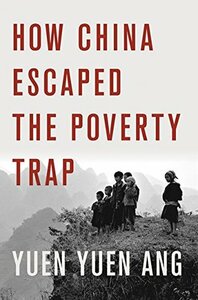Take a photo of a barcode or cover
8 reviews for:
How China Escaped the Poverty Trap (Cornell Studies in Political Economy)
Yuen Yuen Ang
8 reviews for:
How China Escaped the Poverty Trap (Cornell Studies in Political Economy)
Yuen Yuen Ang
adamtad's review against another edition
4.0
A good book, and while I really enjoyed the ideas presented I felt that it could have gone a bit deeper. I felt that some points were over emphasised and I would have loved a potentially longer book exploring some deeper issues. However, I still give it 4 stars as on the whole it was very good, presented not necessarily new ideas, but ideas in a much more understandable way.
mkesten's review against another edition
4.0
One of the strengths of Yuen Yuen Ang’s analysis of China’s phoenix-like rise is to distinguish what is and what is not uniquely “Chinese” about the economic miracle of the past fifty years.
And for the record, a lot of it has nothing to do with being Chinese or being an authoritarian regime.
Coastal provinces succeeded because of their proximity to other eastern powerhouse economies which themselves had become cost uncompetitive through their success.
Coastal provinces also succeeded because of their huge draw on really cheap labour from inland provinces.
In turn, as the coastal provinces lost their competitive advantages because of rising wages and rising land costs the inland provinces made their gains.
Indeed, Deng Xiaoping opened the door to experimentation, to price relaxation, and to privatization of commercial surpluses. Early on, the CCP’s predilection for somewhat vague policies also worked to their advantage. People could begin innovating on a local level with much less fear it would land them in prison.
But the leadership was also pretty clear on what success was supposed to look like.
Capital did not immediately begin to flow into China without a few tried and true methods used in other jurisdictions in earlier times, says Yuen.
Like early America before it, China used taxless financing to spur investment, issuing monopolies, charter rights, and land financing. And like America before it, there were big incentives for corruption at the highest and lowest levels of society.
Some things have changed, some have not. Even as stronger institutions have grown up in China to help accommodate growth, corruption while evolved is still prevalent. The definitions of success have become way more complicated and much harder to achieve, much like in other advanced economies.
The final chapter in this story has yet to be written. China, like America, is a huge polluter. Also, like America, a lot of its wealth is contingent on pushing off the real costs of environmental degradation to the hinterlands, somebody else’s backyard. Many of the elements for its success have moved offshore and real estate speculation has become a national catastrophe on so many levels.
And for the record, a lot of it has nothing to do with being Chinese or being an authoritarian regime.
Coastal provinces succeeded because of their proximity to other eastern powerhouse economies which themselves had become cost uncompetitive through their success.
Coastal provinces also succeeded because of their huge draw on really cheap labour from inland provinces.
In turn, as the coastal provinces lost their competitive advantages because of rising wages and rising land costs the inland provinces made their gains.
Indeed, Deng Xiaoping opened the door to experimentation, to price relaxation, and to privatization of commercial surpluses. Early on, the CCP’s predilection for somewhat vague policies also worked to their advantage. People could begin innovating on a local level with much less fear it would land them in prison.
But the leadership was also pretty clear on what success was supposed to look like.
Capital did not immediately begin to flow into China without a few tried and true methods used in other jurisdictions in earlier times, says Yuen.
Like early America before it, China used taxless financing to spur investment, issuing monopolies, charter rights, and land financing. And like America before it, there were big incentives for corruption at the highest and lowest levels of society.
Some things have changed, some have not. Even as stronger institutions have grown up in China to help accommodate growth, corruption while evolved is still prevalent. The definitions of success have become way more complicated and much harder to achieve, much like in other advanced economies.
The final chapter in this story has yet to be written. China, like America, is a huge polluter. Also, like America, a lot of its wealth is contingent on pushing off the real costs of environmental degradation to the hinterlands, somebody else’s backyard. Many of the elements for its success have moved offshore and real estate speculation has become a national catastrophe on so many levels.
theedness's review
informative
reflective
slow-paced
4.0
A real fascinating exploration of how China enabled innovation within a system of authoritarian rule, drawn out through comparisons between different counties and wider examples like nollywood and renaissance europe. A very academic book, but surprisingly readable and has given me a real insight in to China over the last five years meteoric rise.
mandyla's review
5.0
I just love it when a book totally opens up a whole new way of thinking about things. I don't read much political economy, so to be fair this contains a whole lot of new thinking for me - but I really enjoyed it, and reckon others would too.
(No it isn't perfect - but I look forward to seeing what Yuen Yuen Ang has to say next!)
(No it isn't perfect - but I look forward to seeing what Yuen Yuen Ang has to say next!)
